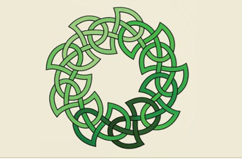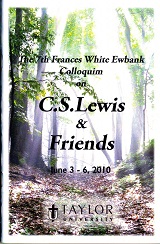Event Title
Academic Paper Session IV-D
Location
Rupp 222
Start Date
5-6-2010 3:00 PM
Description
"Guidelines for Spiritual Reading from C.S. Lewis" - Richard James
To several of his correspondents who asked of him, “What can I read to strengthen my faith?”, C.S. Lewis would provide a spiritual reading list of authors and their books which had helped him grow in his own Christian life. The primary purpose of this paper is to discuss these spiritual reading lists which included devotional books, apologetics, books of poetry, essays, sermons, commentaries, plays, allegories, spiritual autobiography and even novels. For evaluation the individual lists themselves and their provenance will be discussed including a timeline of authors on the lists and information about the recipients. In closing, suggestions will be made for further projects related to the reading of the annotated books in Lewis’ personal library which are on the spiritual reading lists.
"Lewis's Concept of Love in The Great Divorce" - Paulette Sauders
Even though C.S. Lewis wrote his non-fiction book, The Four Loves, later than his fiction, I content that he had been using the concepts of love that he finally wrote about in that book to shape his characters in all of his fiction. I will be examining his fictional The Great Divorce to discover which characters personify the kinds of love and their perversions discussed in The Four Loves as a way to better understand the novel as well as Lewis’s perceptions of love.
"A Time to Choose: Finitude, Freedom, and Eternity in Dante's Commedia and Lewis's The Great Divorce" - Matthew Swift
Many scholars rightly note the use of Dantean imagery and ideas in The Great Divorce, but they do not focus primarily on the relationship between Lewis’s and Dante’s presentations of some central themes. Dante, like Lewis, is deeply concerned with human nature and decisions, especially as they relate to eternity. I propose that Lewis’s The Great Divorce presents views on the intertwining issues of finitude, freedom, and eternity, views which closely reflect those presented by Dante in his Commedia. An examination of each author’s full treatment of these three themes is beyond the scope of this paper, but a brief comparison of their messages in these works certainly merits consideration.
Event Type
Paper
Academic Paper Session IV-D
Rupp 222
"Guidelines for Spiritual Reading from C.S. Lewis" - Richard James
To several of his correspondents who asked of him, “What can I read to strengthen my faith?”, C.S. Lewis would provide a spiritual reading list of authors and their books which had helped him grow in his own Christian life. The primary purpose of this paper is to discuss these spiritual reading lists which included devotional books, apologetics, books of poetry, essays, sermons, commentaries, plays, allegories, spiritual autobiography and even novels. For evaluation the individual lists themselves and their provenance will be discussed including a timeline of authors on the lists and information about the recipients. In closing, suggestions will be made for further projects related to the reading of the annotated books in Lewis’ personal library which are on the spiritual reading lists.
"Lewis's Concept of Love in The Great Divorce" - Paulette Sauders
Even though C.S. Lewis wrote his non-fiction book, The Four Loves, later than his fiction, I content that he had been using the concepts of love that he finally wrote about in that book to shape his characters in all of his fiction. I will be examining his fictional The Great Divorce to discover which characters personify the kinds of love and their perversions discussed in The Four Loves as a way to better understand the novel as well as Lewis’s perceptions of love.
"A Time to Choose: Finitude, Freedom, and Eternity in Dante's Commedia and Lewis's The Great Divorce" - Matthew Swift
Many scholars rightly note the use of Dantean imagery and ideas in The Great Divorce, but they do not focus primarily on the relationship between Lewis’s and Dante’s presentations of some central themes. Dante, like Lewis, is deeply concerned with human nature and decisions, especially as they relate to eternity. I propose that Lewis’s The Great Divorce presents views on the intertwining issues of finitude, freedom, and eternity, views which closely reflect those presented by Dante in his Commedia. An examination of each author’s full treatment of these three themes is beyond the scope of this paper, but a brief comparison of their messages in these works certainly merits consideration.


